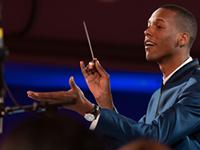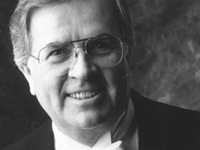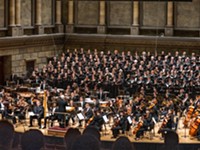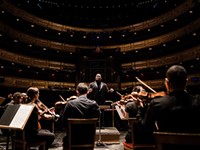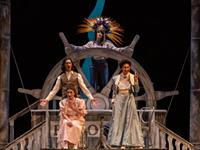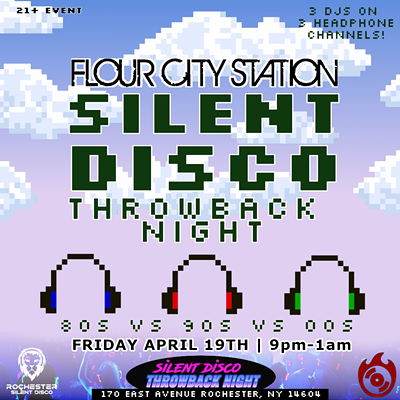Classical Review: In 'Night on Bald Mountain' program, RPO plays the infernal and the impressionistic
By David Raymond[
{
"name": "500x250 Ad",
"insertPoint": "5",
"component": "15667920",
"parentWrapperClass": "",
"requiredCountToDisplay": "1"
}
]
The Rochester Philharmonic Orchestra started 2018 by inviting Marcelo Lehninger, the Brazilian-born music director of the Grand Rapids Symphony Orchestra, to guest conduct this week's program. The RPO performed last night and will repeat the concert on Saturday. Lehninger is offering an unusual but intelligently balanced program: Russian emotional rawness tempered by French Impressionism, and featuring an exciting young soloist.
It may seem curious to name a concert after the shortest work on the program, as the RPO did with this one, but the 19th century Russian composer Modest Mussorgsky was indeed at the center of it. The composer of "Night on Bald Mountain," which opened the second half of the program, was not only admired by his 20th century countryman Dmitri Shostakovich, but was also a profound musical influence on Claude Debussy and Maurice Ravel.
"Night on Bald Mountain" is Mussorgsky's "Dance Macabre," depicting a night of evil spirits running amok on St. John's Mountain before they are dispersed by sunlight and church bells. (You may know it as the soundtrack to one of the cheesier portions of Disney's "Fantasia.") Mussorgsky, however, has it all over Camille Saint-Saëns in power, and "Night on Bald Mountain" is still a remarkably original piece of infernal program music. The RPO's performance had a rough edge or two, but roughness and excitement suits this work, even in the tidied-up version orchestrated by Nikolai Rimsky-Korsakov after Mussorgsky's death.
Shostakovich's First Cello Concerto, written in 1959 for the cellist Mstislav Rostropovich, is a singular work in the concerto repertoire: an almost nonstop cry of pain by a composer who was pursued by Communist Party demons scarier than anything Mussorgsky conjured up on the bald mountain.
It was written during the cultural "thaw" of the Khrushchev years, by a Russian who did not forget the fear and repression of the Stalin era. In the finale Shostakovich dares to quote, and send up, a phrase from "Suliko" -- apparently Stalin's favorite song -- with the soloist and the orchestra repeating a five-note phrase ad nauseam. Written some years after Stalin's death, it was still a daring thing for Shostakovich to do. (Imagine a contemporary Russian composer writing a concerto quoting Putin's favorite song. It's probably something by Andrew Lloyd Webber.)
It is an unsettling but rewarding work, as well as an emotional workout. Soloist Andrei Ionita, a Tchaikovsky Competition Gold Medal winner, made a magnetic RPO debut in this piece. Shostakovich pared down the orchestra by removing all the brass except for a single but prominent horn (played with great authority by Peter Kurau). Every note of the solo part speaks, and it has a lot to say: the concerto begins with four notes from the solo cello, which has very few silent measures in the next half-hour.
From those first notes, Ionita and Lehninger zeroed in on this concerto's haunted, relentless character. The ferocity and the energy level never waned, and Ionita's dark, plangent tone and admirable virtuosity served the music perfectly, whether in its manic or melancholy moments. He gave a remarkable account of the giant written-out cadenza Shostakovich inserted between the slow movement and the finale. This stunning 10-minute passage sounds like a panic attack set to music, and in Ionita's hands it was an emotionally draining soliloquy.
Ravel made Modest Mussorgsky a household name by arranging "Pictures at an Exhibition." If Mussorgsky's influence can be heard in Ravel's "Mother Goose Suite," it's perhaps as a simple but sophisticated poet of childhood, as heard in his song cycle "The Nursery," a work much admired by early-20th century French composers. Ravel's musical take on several famous fairy tales, including "Tom Thumb" and "Beauty and the Beast," is a concise, exquisite orchestral wonderland; the finale, "The Fairy Garden," is one of Ravel's most affecting pieces despite its brevity. Lehninger's delicate interpretation was near ideal, and the RPO's performance highlighted Ravel's many luscious woodwind solos, from the piccolo down to the contrabassoon (who plays the Beast in "Beauty and the Beast").
Debussy paid an admirably direct tribute to Mussorgsky in his "Nocturnes": he simply stole a passage from Mussorgsky's song "Sunless" for his first movement, "Clouds." "Nocturnes" falls easily on our 21st century ears; but much of this music, from the wandering opening to the wordless female chorus at the end, surely sounded absolutely new and weird in 1899, when it was first performed. I don't recall the RPO playing this fascinating orchestral triptych at all recently; it was good to hear it live.
Debussy defined music as "a dream of the senses," and his "Nocturnes" could as easily been named "Three Dreams." "Clouds" is timeless and half-lit, "Festivals" brilliant and brisk, "Sirens" gently but insistently seductive. Fastidiously orchestrated, emotionally elusive, luscious but somehow chaste - the equivalent in painting might be Monet. As he did throughout, Lehninger and the RPO demonstrated an excellent rapport with the color and character of each piece. Concentus Women's Chorus provided the concluding sirens' song, beguiling but slightly sinister in its monotony (sirens did, after all, lure sailors to their doom). This thoughtfully conceived concert began quietly, ended quietly, and made some mighty infernal noise in between.


